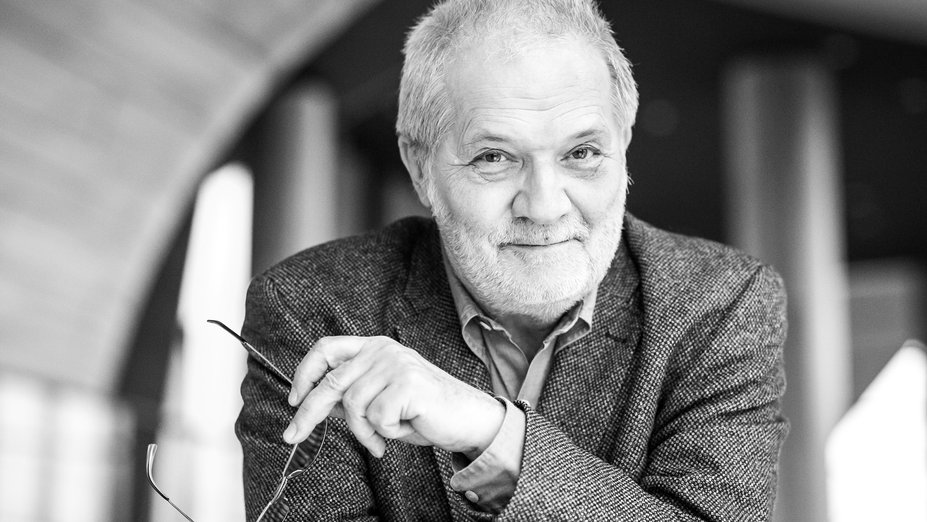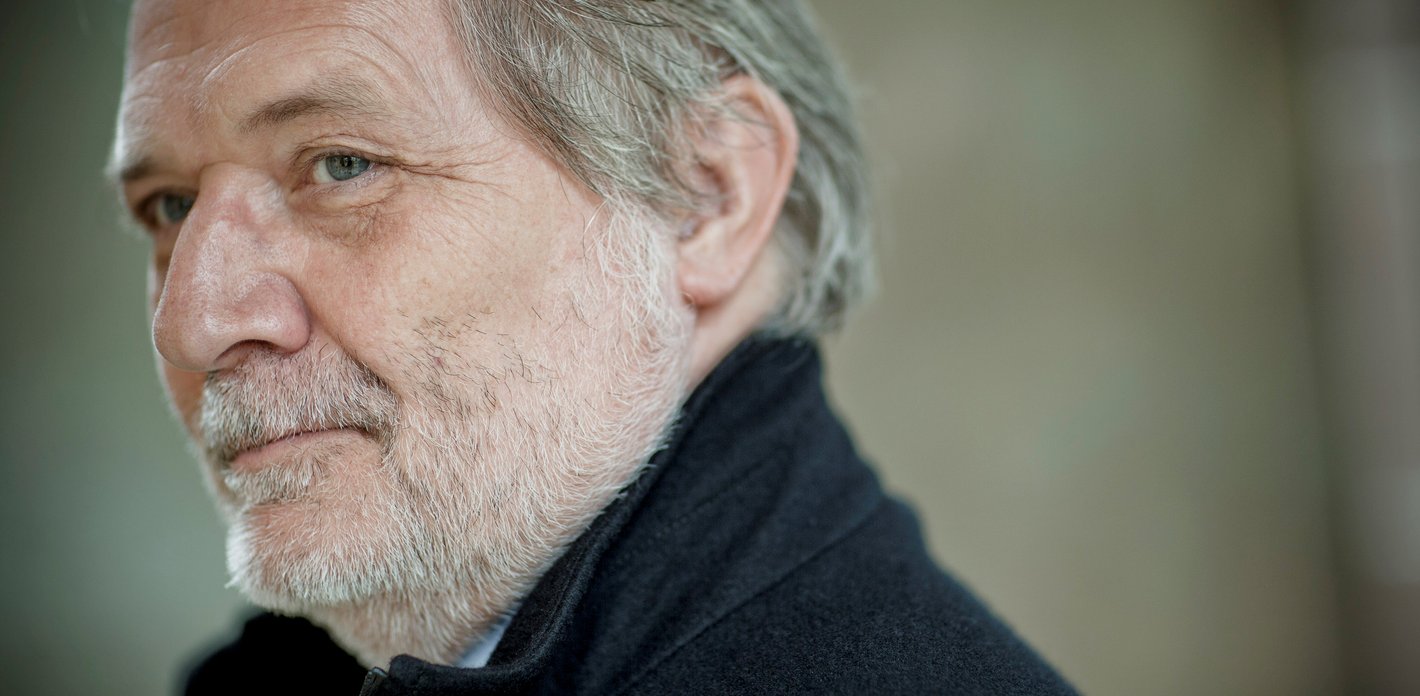The premiere of Peter Eötvösʼs latest work »Multiversum« on 10 October marks the beginning of the Hungarian composer’s artistic residence at the Elbphilharmonie. Throughout the season, Eötvös will be conducting his own compositions as well as works by composers who have had a major influence on him.
Eötvös combined composing and conducting from the outset of his career: he was only 14 when he studied composition with Zoltán Kodály in his home town of Budapest, and he later gained his conductor’s diploma at the Hochschule für Musik in Cologne. In this interview he talks about his double talent and his work »Multiversum«.

Mr Eötvös, the Hamburg public will experience you as a conductor and a composer. Which of the two roles do you primarily see yourself in?
Peter Eötvös: I’m fifty-fifty, in terms of both allegiance and how I divide my time. I try to spend about six months of the year composing, and I devote the rest of my time to conducting. Of course the two activities are not strictly separated, one tends to blend with the other. And that’s exactly the challenge: I need time, concentration and peace to come up with the creative ideas for a composition, while conducting calls for a lot of preparation. But very different as they are, these two activities complement each other.
»My experience as a conductor is reflected in the scores I compose«
Peter Eötvös
In what way?
The things that I learn from other composers – compositional thinking, looking for colour and giving music a structure – are things that I can then project on to my work as a conductor. And of course, this works the other way round, too: my experience as a conductor is reflected in the scores I compose. In the last few months I conducting several first performances and I noticed in the rehearsals that there was hardly anything I needed to correct. Where something needs correcting, it’s generally just dynamic markings.

So you have a very clear idea of how you want the score to sound. How do you manage to hear the notes on the paper in your mind?
You need quite a bit of experience before you can translate the written score into sound in your mind. I compose in real time, i.e. I start at the beginning and work through the score vertically, bar by bar. That’s my attempt to record on paper what I can hear in my head. The idea of the sound I’m aiming at is similarly concrete to that of a film director who knows exactly how he wants the pictures to look on the screen. I don’t work at the piano, either: I sit at my desk with a pencil and an eraser!
»I compose in real time, i.e. I start at the beginning and work through the score vertically, bar by bar.«
Peter Eötvös
Do you know from the outset which direction a score is going to take?
Not necessarily. There’s generally a seed, but I don’t know exactly what it’s going to grow into, how tall the flower or the tree will be. I only see the little seed, and it grows slowly. In the process of composing, I follow the stream of my thoughts, which derive from the material I’ve got in front of me.

»As soon as a work appears in print, it becomes alien to me: then I no longer see the score as a composer, but from a conductor’s point of view. «
Peter Eötvös
What’s it like to conduct your own works?
That’s a tricky situation, at least at the beginning of the first rehearsal. As I said, while I’m composing I have an idea in my mind of how I want the piece to sound. Therefore, the first contact with the actual sound of the music is something special; it involves comparing my idea with reality. The musicians are playing the piece for the first time, after all. When something doesn’t sound quite right, it can be hard to judge whether it was my mistake, or whether the rehearsal process hasn’t reached the point where the orchestra can realise my idea just as I intended it. In this moment, my role is 100% that of conductor: I get to know my own works in rehearsal just I would the works of other composers. It may sound odd, but as soon as a work appears in print, it becomes alien to me: then I no longer see the score as a composer, but from a conductor’s point of view.
On 10 October you will be conducting the first performance of your own work »Multiversum«. What can you tell us about it?
The Elbphilharmonie organ supplied the inspiration for my new work. Iveta Apkalna played the instrument for me, and I was really taken by it. Then there is a Hammond organ with its characteristic sound; both instruments are on the stage at the same time: the keyboard of the big organ on my left, and the Hammond organ on my right. What a fantastic combination! The sound of the big Elbphilharmonie pipe organ will be coming from the front, while we’ll spread the sound of the Hammond organ throughout the hall with the help of four microphones, so that the audience will be surrounded by organ sound from all sides. Last but not least, the orchestra will be assembled between these two organ worlds: I’ve planned the layout so that the woodwind is on the right, the string section on the left, and the brass and percussion across the full breadth of the stage. This way, there will be a »galactic« space in between the two organs.
Does this setting reflect something of the idea of »Multiversum«?
Absolutely – although it’s not meant as an illustration. My underlying idea is rather to show that universes with similar structures can exist alongside or above one another. I believe that our universe is not the only one – we are just one part of this huge cosmos. Plus, the layout of the musicians forms a fundamental part of the form, of the construction and structure of my compositions. Whether a particular sound comes from the right or the left, or how groups of instruments enter into dialogue with each other, is very important!

Hans Werner Henze once said that he wanted to write music for »people in need of beauty«. Can you identify with this aesthetic maxim?
When I worked with Stockhausen in Cologne in the 60s and 70s, there were two different camps: on the one hand there was the Darmstadt school, whose leading lights were Stockhausen and Boulez, and on the other there was Henze. Even back then, I tried to be independent and not get involved in what were sometimes heated discussions, and I’m happy that I never belonged to any particular school. This aesthetic conflict really bothered me at the time, among other things because it was an artificial debate in part. I studied with Bernd Alois Zimmermann in Cologne, who was also the opposite of Stockhausen. But for me, both approaches were important; I found both worlds interesting. I’m pleased to say that such debates now belong to the past: today, it’s the individual who counts, the phenomenon of a composer creating his own individual world. In my case, the world I create changes from one piece to the next: it’s very important to me to avoid repetition.
»I’m happy that I never belonged to any particular school. This aesthetic conflict really bothered me at the time«
Peter Eötvös
»My music is a pictorial language.«
Peter Eötvös
Is that what lies behind your comment: that you want to write music for people to listen to, and not to be the subject of learned analyses?
It’s really important to me that the first note the audience hears represents an invitation for them to continue listening. I want to involve my audience: I don’t just want them to listen, I want them to take part. At the beginning of my career I did a lot of theatre work, and in the theatre you notice immediately whether the music is working with an audience or not. If it works, it creates pictures in people’s minds. So »sound theatre« means that we see something, even though we are »only« hearing music. That’s what my music is: a pictorial language.
Interview: Bjørn Woll

The full-length interview is published in the current Elbphilharmonie Magazine (German only).




